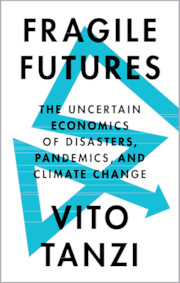Book contents
- Fragile Futures
- Fragile Futures
- Copyright page
- Contents
- Acknowledgments
- Epigraph
- Part I Uncertain Future Events and Reactions to Them
- Part II Pandemics and Other Disasters
- Part III Climate Change and Global Warming
- 11 When the Earth Became Man’s Private Property
- 12 Early Concerns about the Environment
- 13 From Environmental Concerns to Climate Change
- 14 From Climate Change to Global Warming
- Part IV Back to Some Theoretical Issues
- References
- Index
11 - When the Earth Became Man’s Private Property
from Part III - Climate Change and Global Warming
Published online by Cambridge University Press: 28 April 2022
- Fragile Futures
- Fragile Futures
- Copyright page
- Contents
- Acknowledgments
- Epigraph
- Part I Uncertain Future Events and Reactions to Them
- Part II Pandemics and Other Disasters
- Part III Climate Change and Global Warming
- 11 When the Earth Became Man’s Private Property
- 12 Early Concerns about the Environment
- 13 From Environmental Concerns to Climate Change
- 14 From Climate Change to Global Warming
- Part IV Back to Some Theoretical Issues
- References
- Index
Summary
Description: Humans had shared the Earth with other species but, increasingly, they have been shaping the natural environment for their exclusive benefit. In the process, they have been creating social costs that are not reflected in the prices of the market’s goods and services. This has happened especially in the use of fossil fuels to produce energy, but also in other products, such as beef and plastic. Humans have entered what has been called the “Anthropocentric Era,” an era in which they have come to see the Earth as their private property. Like most private property, it can be “used and abused” by the owners for their exclusive welfare. The number of human beings has increased enormously over the last century and is expected to continue to increase by several more billions this century. Humans have been using natural resources to sustain them and to improve their standard of living. <break>Some attempts to reduce their negative impact on the natural world have been under way for some decades (use of “green energy” etc.). So far, these attempts have been far from what is needed to prevent the world from becoming biologically poorer and from making the climate dangerously warmer. <break>Market fundamentalism has paid little or no attention to these problems and much attention to improving production and incomes. There is a clear need to change, dramatically, our theoretical economic thinking and our policies. And the sooner, the better. But the changes needed are very difficult.
Keywords
- Type
- Chapter
- Information
- Fragile FuturesThe Uncertain Economics of Disasters, Pandemics, and Climate Change, pp. 133 - 140Publisher: Cambridge University PressPrint publication year: 2022



